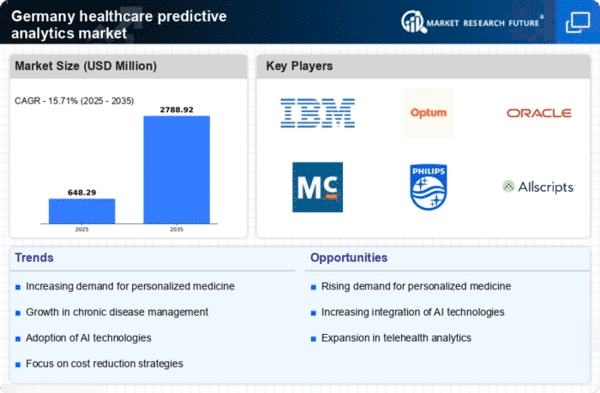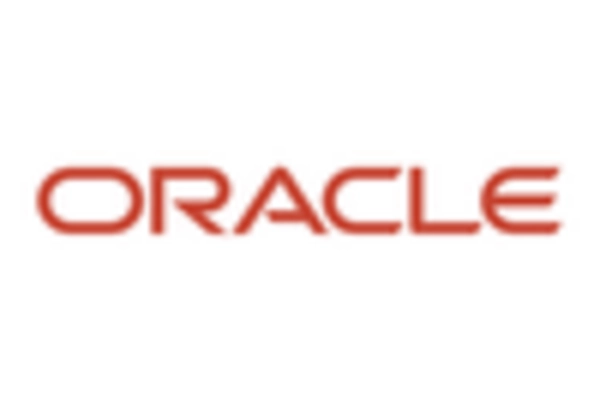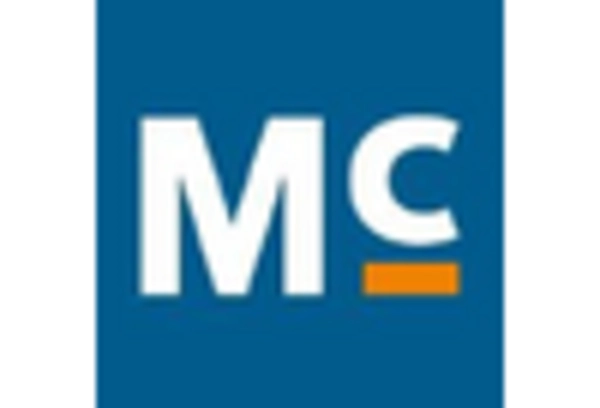Focus on Chronic Disease Management
Chronic disease management remains a critical driver for the healthcare predictive-analytics market in Germany. With an increasing prevalence of chronic conditions such as diabetes and cardiovascular diseases, healthcare providers are compelled to adopt predictive analytics to manage patient care effectively. Reports indicate that approximately 60% of the German population suffers from at least one chronic illness, necessitating innovative solutions for monitoring and treatment. Predictive analytics tools enable healthcare professionals to identify potential complications early, thereby improving patient management strategies. This focus on chronic disease management is expected to significantly contribute to the expansion of the healthcare predictive-analytics market.
Advancements in Machine Learning Algorithms
Advancements in machine learning algorithms play a pivotal role in shaping the healthcare predictive-analytics market in Germany. These sophisticated algorithms enhance the ability to analyze complex datasets, leading to more accurate predictions and insights. As healthcare organizations increasingly adopt machine learning techniques, the market is projected to grow at a compound annual growth rate (CAGR) of around 20% over the next five years. The ability to process large volumes of data efficiently allows for improved patient stratification and risk assessment, which are crucial for effective healthcare delivery. Thus, the evolution of machine learning technologies is likely to drive the healthcare predictive-analytics market forward.
Rising Demand for Data-Driven Decision Making
The healthcare predictive-analytics market in Germany experiences a notable surge in demand for data-driven decision-making processes. Healthcare providers increasingly recognize the value of leveraging data analytics to enhance patient outcomes and operational efficiency. This trend is underscored by a reported growth rate of approximately 25% in the adoption of predictive analytics tools among healthcare organizations. As hospitals and clinics seek to optimize resource allocation and improve patient care, the integration of predictive analytics becomes essential. This shift not only aids in identifying at-risk patients but also facilitates personalized treatment plans, thereby driving the overall growth of the healthcare predictive-analytics market.
Integration of Electronic Health Records (EHR)
The integration of Electronic Health Records (EHR) systems significantly influences the healthcare predictive-analytics market in Germany. EHRs serve as a foundational element for data collection and analysis, enabling healthcare providers to harness vast amounts of patient data. The German government has invested heavily in digital health initiatives, with over €4 billion allocated to enhance EHR systems. This investment fosters a conducive environment for predictive analytics, as healthcare organizations can utilize historical patient data to forecast trends and improve clinical outcomes. Consequently, the seamless integration of EHRs is likely to propel the growth of the healthcare predictive-analytics market.
Government Initiatives for Digital Health Transformation
Government initiatives aimed at digital health transformation significantly impact the healthcare predictive-analytics market in Germany. The German government has launched various programs to promote the adoption of digital health technologies, including predictive analytics. With an investment of approximately €2 billion in digital health infrastructure, these initiatives encourage healthcare providers to integrate advanced analytics into their operations. This support not only enhances the capabilities of healthcare organizations but also fosters innovation in predictive analytics solutions. As a result, the healthcare predictive-analytics market is poised for substantial growth, driven by these proactive government measures.
















